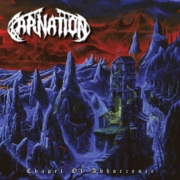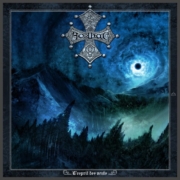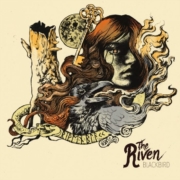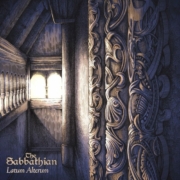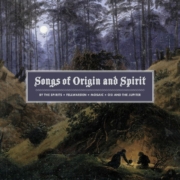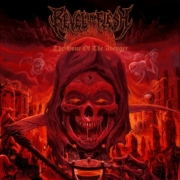Yesterday was a lazy day for me. At some point I found myself just casually checking out some of the videos YouTube suggested to me. You run into some bands with potential, some bands that sound like all the other bands on their label and eventually you find a band worth writing about. Today I’m here to write about one of those bands: Apocalypse Orchestra whom released The End is Nigh earlier this year.
“Deep voices singing in harmony, epic beards, riffs you could slice stones with and bagpipes; it’s all there in the Apocalypse Orchestra.” That’s how I described the music video of The Garden of Earthly Delights (which you can see below) when I shared it via my own facebook page (Beyonder). The Swedish quintet clearly drew inspiration from medieval times but don’t need any sword fighting between knights and Vikings to distract us from poorly written lyrics or sloppy riffs. On the contrary even. Their blend of heavy riffs, tight drums and the fluent interaction between vocals and the melodic instruments (bagpipes and hurdy-gurdy) keep the album-opener entertaining for nearly nine minutes despite the relatively slow pace.
The second track on the hour-long epos is Pyre. While the same doom-esque pace continues in the drums, the guitar and bass give us less of a prog-vibe and leave more space for the melodic instruments and especially the vocals. The voice of singer/guitarist Erik Larsson is left somewhat more vulnerable on its own at times but there’s no need in worrying if he was going to pull it off all on his own because he gets well-timed support from a very controlled grunting band-member.
Flagellants’ Song starts with Pie Jesu, the last verse of Dies irae, most commonly used in requiems. [I included my thoughts on that intro at the bottom of this article since it turned out to be a bit lengthy.] The track continues with a similar doom tempo we got in the first two tracks, but the melodies get a folk sound which is somewhat reminiscent of Eluveitie. A choir lays a blanket of harmony on top of it, before the song breaks down and re-introduces the warm voice of Erik Larsson accompanied by an acoustic guitar and the drums. Slowly the track gets re-built step by step before breaking down again. In this very organic process they never lose that vibe which makes you nod along.
Drums and an organ sound which had up to this point been tucked at the background introduce us to Exhale. Unsurprisingly, the tempo of this song is very slow again. Even more so than the first three tracks. This song might remind you of acts like Novembers Doom because initially a solo voice takes the melody. Despite the double bass-drum in the midsection of the song and the solo-guitar taking over the lead melody in the latter third, Exhale seems slightly uninspired and on the verge of being a filler instead of a killer.
After the acoustic intro of Theatre of War it quickly becomes clear we’re in for more of the same. Luckily we get a similar process of building up to break downs again which made Flagellants’ Song a coherent track that doesn’t get dull or boring during its 7-8 minutes playtime. But if you were thinking it was just about time to step up the pace, you might be disappointed to hear they slow down even more and go full doom with the ‘apocalypse knocking on your front door.’
The black plague of 1349 is the central theme in The Great Mortality, which is hardly a surprise given the appearance of a plague doctor’s mask both on the album cover and in the video clip of The Garden of Earthly Delight. A bit morbid perhaps, but it seems to have an effect on the catchiness and the diversity of the track which brings the album back to the level of its opening tracks.
Before the album comes to a close with Here be Monsters, the instrumental To Embark shows us the more folky side of Apocalypse Orchestra. With an almost danceable melody on top of a steady drumbeat, the final track on the record takes over fifteen per cent of its playing time and is in fact a great summary of what the band is all about. A warm lead vocal gets support of a well-orchestrated choir, melodies of bagpipes, hurdy gurdy, cittern, rauschpfeiffe and mandola float over heavy riff-ing and the backbone of super tight drums. In fact, we get even more than that. The grunts previously only heard as support now take the lead from time to time. This very strong album-closer almost makes me forget my slight worries mid-album on whether or not they could keep their formula fresh long enough.
All in all Apocalypse Orchestra brings a unique approach to doom metal inspired by medieval folk. I feel they shouldn’t refrain from upping the pace every once in a while to broaden their horizons and create more diversity, but that’s merely a personal opinion. If you’re into either doom or folk metal you should check out this record. Even if it’s not entirely your cup of tea, you’ll find it hard to deny they take on an interesting perspective on how both subgenres can be complimentary.
Release: May 12th 2017
Label: Despotz Records
Tracklist:
1. The Garden of Earthly Delights
2. Pyre
3. Flagellants’ Song
4. Exhale
5. Theatre of War
6. The Great Mortality
7. To Embark
8. Here Be Monsters
—————————————————————————————————————————————–
About the use of Pie Jesu as an intro for Flagellants’ Song:
It is worth noting they don’t claim to play medieval music but rather draw inspiration from it. So we don’t get to hear anything like Johannes Ockeghem’s or Guillaume Dufay’s compositions (dating from the 15th century and as far as I can tell, the only recovered medieval compositions based on the text that is at least dating from the 13th century but is possibly even several centuries older). In fact, a choir featuring female singers would be a severe anachronism if you claim to be medieval, but so are electric guitars, obviously. Interestingly however, Apocalypse Orchestra didn’t even opt for one of the versions of renown composers like Sixten, Duruflé, Mozart, Verdi or Fauré (of which none other than Saint-Saens said “Just as Mozart’s is the only ‘Ave Verum Corpus’, this is the only Pie Jesu.”) Even though I’m personally not inclined to agree with Saint-Saens, I’m slightly puzzled why exactly they based this intro on a scene from Monty Python and the Holy Grail. It is funnier of course, but you’d expect them to be aware Blind Guardian opened their Follow The Blind record with the same joke (and inexplicably called it ‘Inquisition’). However, I must say Apocalypse Orchestra did a better job transitioning into the instrumental continuation of the music.



